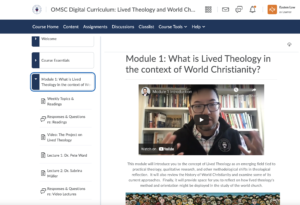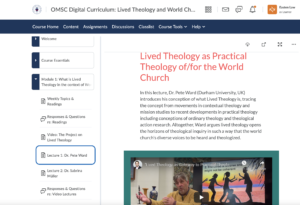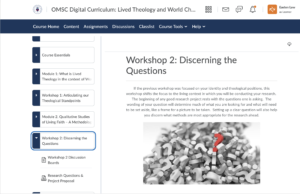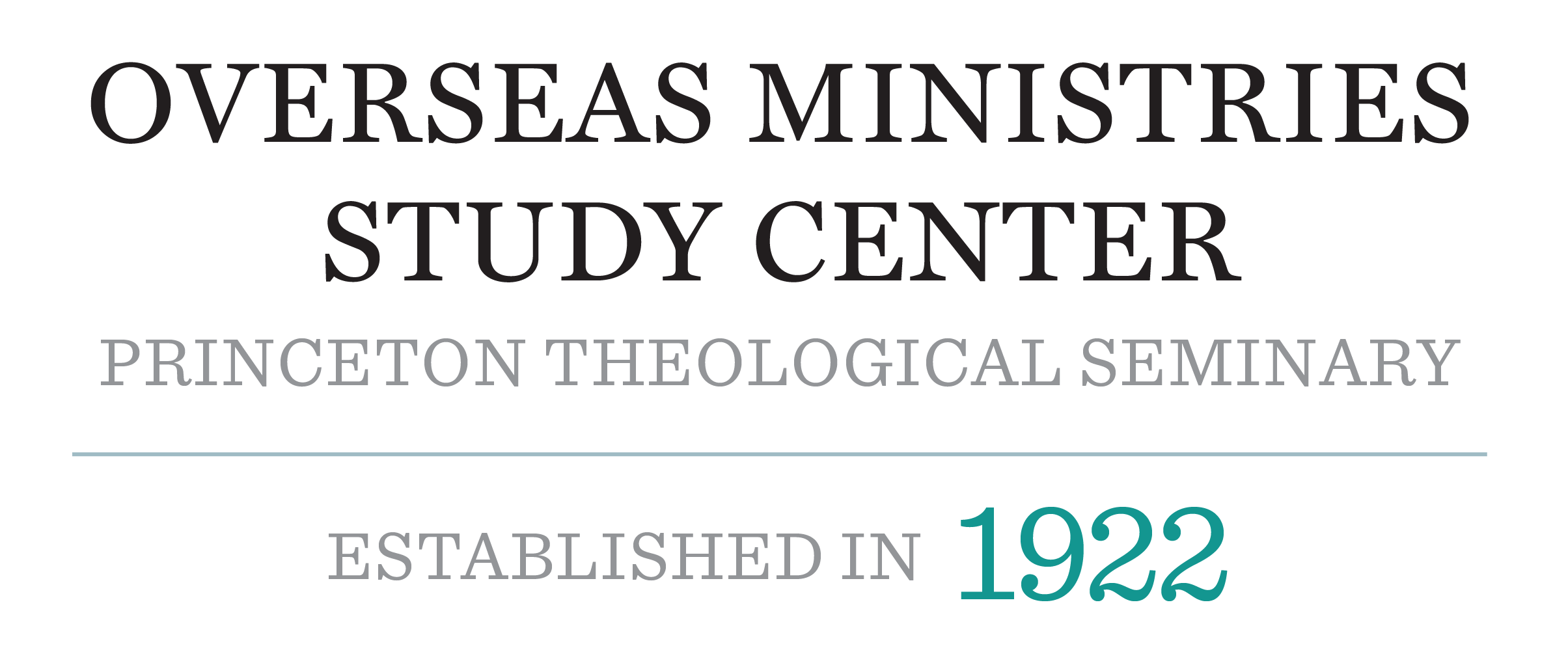
“Theology is an academic discipline, to be pursued like other disciplines, with rigor; but its sources lie not in the study or the library, but in the nature of Christian life. The mainspring of theology is in the decisions that Christians—all Christians—have to make; simply because they are Christians.”
-Andrew F. Walls, Foreword to Re-Imagining African Christologies ed. Victor Ezigbo (Pickwick, 2010).
Introduction:
OMSC@PTS’s online certificate program seeks to amplify the voices of the world Christian movement by training a new generation of scholars and church leaders to better observe and share how God is at work in their particular social and cultural contexts.
The program brings together video lectures, online seminars, personal mentoring, and collaborative workshops to provide learners a set of tools in qualitative research and theological reflection to build a pathway to discerning lived theologies in their context with an online community of practice.
This course of study is designed for advanced students and church leaders seeking additional training/resources for their research and established ministry leaders working in congregations, denominational leadership, and/or faith based NGOs seeking to gain new insights into their ministries.
Delivered fully online across an academic school year from September to June in a largely asynchronous format, program content is roughly equivalent to graduate level coursework on lived theology, world Christianity, and qualitative theological research methods. Plan to spend four to five hours a week on this course. A stable internet connection is necessary to participate.
Learning Outcomes:
By the close of this course, students will be able to…
- … Understand the basis for the emerging field of lived theology and consider its implications for the study of mission, world Christianity, and intercultural theology.
- … Apply qualitative research methods as a tool for theological reflection and pastoral engagement within their sense of vocation and their ministry/research contexts.
- … Analyze the ways lived theology and its various methods can be utilized for scholarship and ministry from and for different parts of the world.
- … Evaluate lived theology’s potential for addressing foundational questions of mission and discipleship in the global church.
Hear a former participant’s perspective on our online certificate program:
Applications for 2025-26 academic year are now closed
Applications Due: June 30, 2025
Acceptance Notifications: August 1, 2025
Time Frame of Program: September 15, 2025–June 22, 2026
Participation Cost: $750
Thanks to philanthropic support, we are able to offer this program—valued at $3,495—for a deeply discounted rate of $750. This is part of OMSC’s ongoing commitment to equitable and inclusive theological education worldwide.
Additional scholarships are available for those with financial need
If you are serving as a reference for an applicant, you may still submit your letter of recommendation via this link:
Participation Tiers:
New for the 2025-26 academic year, learners may apply and participate in this online program via three tiers to meet different levels of interest and capacity. Please consider which tier is best suited to your current interests and season of life. Please be mindful that, upon reviewing your application materials, course facilitators may recommend a tier different from the one you are applying for.
Those who complete the requirements for their tier will be awarded a corresponding certificate in Lived Theology and World Christianity presented by OMSC and Princeton Theological Seminary’s Office of Digital Learning.
- TIER 1: Exploratory – at this exploratory level, you will be provided access to the whole course of study but with adjusted levels of participation in modules and workshops. Instead of a final research paper, exploratory participants will submit an open ended reflection paper in response to the simple question, “what have you learned from this course of study?” This tier is most appropriate for curious learners who recognize they do not have the time or capacity to complete the program but are still interested in learning as they are able.
- TIER 2: Standard – at the standard level, you will be expected to complete all requirements related to the modules and workshops that make up this program. For the final research paper, you will be expected to apply core concepts to your context of ministry. This paper will connect the dynamics and methods in lived theology explored in the course with existing literature related to the questions and experiences you observe in your ministry.
- TIER 3: Advanced with Independent Research – at the advanced level, in addition to completing the necessary modules and workshops at the standard tier, a research mentor will advise you as you complete a small scale lived theology project that requires independent qualitative research and theological reflection with a specific question set in your context of ministry. Your final research paper for this advanced course of study will be a formal paper that reports on the findings of your project and reflects on its implications for church, ministry, and theology in your context.
Joining a Learning Hub:
For the 2025-26 academic year, we are pleased to expand our learning hub program. Working in collaboration with our global partners, we will be able to offer on-site learning hubs where a dedicated hub facilitator and research mentor will meet regularly and in person with a small group of locally based participants to discuss the course content and advise on research projects.
- Accra, Ghana (The Sanneh Institute w/ Dr. Matthew Krabill)
- Manila, Philippines (De La Salle University w/ Dr. Fides Del Castillo),
- Turku, Finland (The Polin Institute w/ Dr. Francis Kwabena Benyah)
Have questions? please contact Dr. Easten Law if you have questions about this opportunity.
What is Lived Theology in the Context of World Christianity?
Lived theology is an emerging sub-discipline at the intersection of sociological, anthropological, and theological research that seeks to discern and articulate how God is present and engaged in and through the lived experiences of the church. We believe it is a promising paradigm for the multidisciplinary fields of Mission Studies, World Christianity, and Intercultural Theology. Curious to learn more? You can view Dr. Easten Law’s introductory lecture on Lived Theology and World Christianity below.
Lived Theology & Methodology in World Christianity
Read more about the program’s development and foundations at the Princeton Seminary website and The Occasional, OMSC’s blog:
- OMSC Introduces Online Certificate in Lived Theology and World Christianity
- Engaging Lived Theology around the World with OMSC’s Online Certificate Program
- Pursuing Lived Theology in the Context of World Christianity – Part 1: A Working Definition
- Pursuing Lived Theology in the Context of World Christianity – Part 2: Student Perspectives and “Glocal” Learning Hubs
- Pursuing Lived Theology in the Context of World Christianity – Part 3: Honoring African Legacies in Partnership with the Sanneh Institute
Course of Study Structure:
This online course of study consists of content units and workshop forums. Each month, a module and workshop will be released. The goal of this curriculum is not only to strengthen learning and research but also to build a online community of practice and theological reflection that strengthens the witness of the world church.
 Content Units are largely self-guided and asynchronous, which means that much of the work will be completed on your own time. Each unit brings together video lectures with some of the top scholars in practical theology and world Christianity as well as new emerging voices from around the world. These lectures are paired with a curated set of readings that will introduce the foundations of world Christianity and lived theology. While all readings and video lectures will be completed independently, group discussion boards provide opportunities to discuss the material with one another. In addition, synchronous online meetings will be scheduled every two to three months to provide space for face to face conversations. Unit topics include (but will not be limited to)…
Content Units are largely self-guided and asynchronous, which means that much of the work will be completed on your own time. Each unit brings together video lectures with some of the top scholars in practical theology and world Christianity as well as new emerging voices from around the world. These lectures are paired with a curated set of readings that will introduce the foundations of world Christianity and lived theology. While all readings and video lectures will be completed independently, group discussion boards provide opportunities to discuss the material with one another. In addition, synchronous online meetings will be scheduled every two to three months to provide space for face to face conversations. Unit topics include (but will not be limited to)…
- What is Lived Theology?
- What is World Christianity?
- Qualitative Studies of Living Faith – A Methodological Review
- Qualitative Research & Theological Construction
- Majority World Perspectives & Case Studies
- Ecumenical & Missional Impulses

Each unit features video lectures from prominent scholars and practitioners including…
- Dr. Pete Ward (Durham University)
- Dr. Nancy Ammerman (Boston University)
- Dr. John Swinton (Aberdeen University)
- Dr. Sabrina Müller (University of Bonn)
- Dr. Mary Clark Moschella (Yale Divinity School)
- Dr. Gina Zurlo (Harvard Divinity School)
- Dr. Sam George (Wheaton College)
- …and many more

Workshop Forums are oriented toward providing basic training in qualitative research methods and space to explore the implications of the content in your own sense of vocation, research, and ministry. They provide the backdrop from which one can plan and execute a lived theology project. Workshop forums consist of three components: (1) active participation in a series of questions posed in the discussion board on the month’s topic, (2) short video lectures introducing basics of semi-structured interviews and participant observation, and (3) individual and/or small group coaching with the instructor on a bi-monthly basis.
- Articulating our Theological Standpoints
- Discerning Questions & Methods
- Analyzing of Culture and Contexts
- Exploring Living Faith in Multiple Contexts
- Negotiating Living Faith Inwardly & Outwardly
- Discerning God’s Presence and Theologizing Together.



